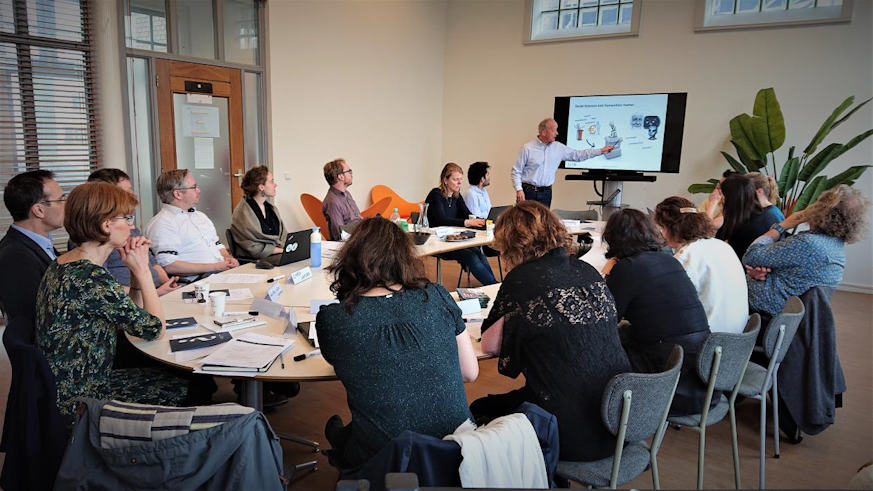SPARK shows way for European social science parks
21 March 2019

Cardiff University is leading the way in Europe by creating a Social Science Park (Spark) that brings benefits to wider society.
International experts say university investment in bespoke social science facilities can create processes and services that impact on everyday life.
Delegates singled out Cardiff’s Social Science Research Park – currently under construction – for praise at a recent ASTP Proton Social Sciences, Humanities and Arts (SSHA) Knowledge Exchange Special Interest Group.
A range of European academic institutions are currently following Cardiff’s lead and investing in dedicated spaces to trial and test social science solutions.
The new Spark hub – under construction at Cardiff Innovation Campus – will feature a range of spaces where social scientists work with public, private and Third sector partners to find innovative solutions to societal problems through collaborative research.
Professor Rick Delbridge, Dean of Research, Innovation and Engagement at Cardiff University, gave delegates a ‘virtual tour’ of SPARK, which will feature labs, offices and creative zones to make great ideas come to life.
“ASTP Proton is a European organisation dedicated to transferring knowledge between universities and industry,” said Professor Delbridge.
“Delegates, who were mainly technology transfer officers, acknowledged that Cardiff is showing the way in creating a bespoke, dedicated space where ideas that create economic and public value can be developed with a range of partners.”
Social science can help explain how our own society works - from the causes of unemployment or what helps economic growth, to how and why people vote, or what makes people happy. It provides vital information for governments and policymakers, local authorities, non-governmental organisations and others.
Several European universities are developing centres that will complement Cardiff’s approach.
Christoph Köller is co-founder of Görgen & Köller GmbH (G&K), a science consultancy company based in Germany. He is currently engaged in projects focusing on the impact of humanities and social sciences in Germany and Europe, and he leads the SSHA Knowledge Exchange special interest group.
Christoph said: “Social Sciences and Humanities have a huge innovation potential which is not yet exploited systematically. A dedicated physical home with appropriate networks, programs and structures is needed to support impact creation from and with the social sciences and humanities in a best possible way. SPARK is a pioneer in creating a bespoke innovation infrastructure for the social sciences. Taking SPARK’s experiences into account we are right now developing the Humanities Matter Lab at the University of Cologne.”
Institutions represented at the ASTP Proton event included Knowledge Transfer Officers from universities in Belgium, the Netherlands, Czech Republic, and the UK. The workshop took place at the Humanities Lab Amsterdam Ventures Studio.
The latter, based on six sites across the city, has created 17 start-ups and works with staff and students. It provides working and meeting spaces, coaching, educational programmes, and connects student starters with researchers and to customers.
Jonneke Bekkenkamp, from HL AVS, said: “We were very interested to hear about the steps Cardiff is taking to create a bespoke platform where researchers and partners can co-locate to co-create knowledge with companies, educational institutions, investors, health care providers, entrepreneurs, government bodies and societal organisations. It’s an extremely exciting project that will help external organisations find new opportunities and solutions to society’s problems.”
Cardiff’s Spark facility is due to open in 2021. Housed in a communal space that removes barriers and promotes face-to-face interaction, Spark will be a catalyst for out-of-the-ordinary thinking. It will be based in Innovation Central (IC), giving tenants access to commercial offices for spinouts and start-ups, wet/ dry lab spaces, a visualisation lab, creative spaces and a flexible auditorium in which to host events.
Promoting a collaborative and problem-focused approach, it will translate outstanding research into real-world solutions.




